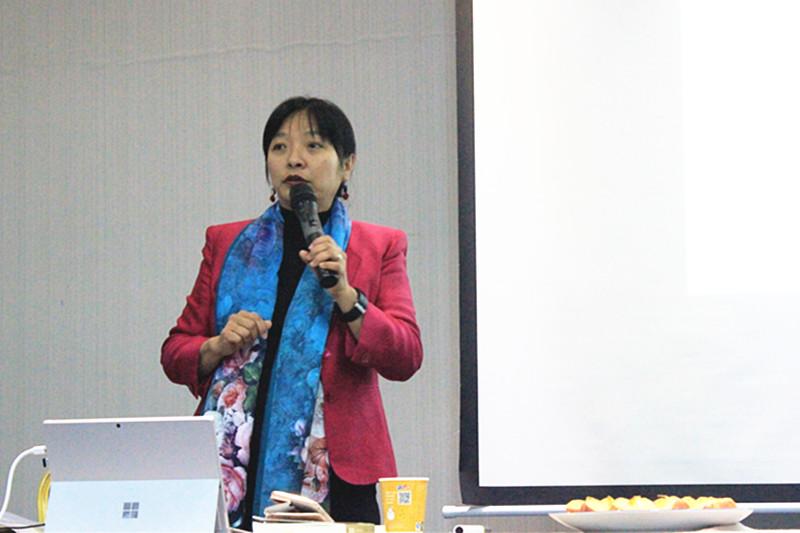At a homeschool workshop in Hangzhou recently, Yiwen Caroline Chen Huang, Master's of education at Harvard Graduate School of Education and mother of four, spoke at the meeting titled "Education of Love." Using her rich teachings and experience, she helped many parents to really understand issues like "How to educate and help children grow up" "corporal punishment, yes or no" and more.
There were three classes titled "Parents, how to let go so your children will learn self-discipline", "Teach children to set up family rules and decide consequences", and "how to homeschool." Huang gave extensive and in-depth explanations from different perspectives on Chinese education: Spare the rod, spoil the child. No child is perfect and every child is a "jar with cracks," meaning that they will have shortcomings but also strengths. Parents should find their children's strengths and appreciate them so that children will blossom and grow. "Growth comes not from criticism. Children need to be discovered and encouraged to be brighter."
Huang said that "Children are not our private property. They're gifts from God." We need to give children love like a safety net, strong and stretchy to accept their failures. What is "safety net" love? In the circus, tightrope walkers sometimes fall and the safety net catches them. This net is very stretchy, but it doesn't bounce people out. Education is the same: there are strengths, rules, and restraints, yet there is also stretchy love to hold them instead of bouncing them out. "Love and discipline are the abilities every parent should have. Love comes first, then discipline. Without love, there is no way to discipline. Love and discipline, they're not balanced but an order issue."
In Chinese education, corporal punishment seems to be very common. However, Huang believes that the focus of educating children is all on the parents -- how can we be good parents instead of disciplining them. It is not that we can't use corporal punishment at all. We just need to follow the principle of "NO COLD NO HOT. With the first "No," parents can't use corporal punishment when they're angry. "Cold" refers to parents who are merciless and use cold words; they can't lay a finger on their children. With the second "No," there should be no physical punishment when they are verbally punishing. "Hot" means do not seek punishment in rage. Huang also stressed to parents, "do not casually scold children." When parents lose their emotional control, in a hurry or in a bad mood, they will make their children obey them by scolding. But there are consequences of scolding.
1. It makes children become a person who only appears to comply.
2. Children do not take parents' words seriously if they are scolded too often
3. Scolding may create weak children with no confidence.
4. Children may become passive in doing things without care or passion.
Scolding doesn't solve problems. We need to help them and guide them to think how to solve problems.
Huang also talked about principles for setting family rules:
1. Implement rules as actions
2. Write the family rules down and put them somewhere the whole family can see. No backing out
3. When children make mistakes at home, correct them according to the family rules and determine appropriate consequences carried out according to the "NO COLD NO HOT" principle. Finally, comfort, accept and hug them so that they know they are taking the consequences not because the parents do not love them anymore but because they made a mistake. Though they may be unhappy after being disciplined, the family rules can help them set up rules, so they can grow from being disciplined by others to self-discipline.
After each class, there was also QAs. One parent asked about how to deal with children who like to be held by the father when eating and have strong emotion reaction. Huang answered that they could set up rules: the child must sit in the little chair at the dining table. She can choose not to eat or play with her toys, but she has to sit there. Dad can hold her only after dad finishes his meal, and she has to respect her dad's need to eat. This is the boundary she needs to understand. When she grows up and has started to have her own thoughts and abilities with her body, she will have the need to explore. This is not rebellious and parents should help her instead of changing her. When she is in a bad mood, first acknowledge her mood and then try to guide her and learn why she's not happy. Or give her a quiet place and allow her to vent.
After the classes, a parent shared her joy on the topic. She said that it was not easy to educate children and through this study, she learned that parents and children need to grow together in education. They need to focus on the inside world of the children and guide and build the children with God's words.
About Yiwen Caroline Chen Huang:
Master of Education at Harvard Graduate School of Education, expert on bilingual cognition and multicultural education across the world. Caroline has over 30 years front-line education experience in the USA.
Caroline has been working and living in Beijing for 6 years and works as an educational consultant and curriculum development supervisor in multiple international schools.
Caroline is a mother of four. Her oldest daughter graduated from Harvard, the second daughter from the University of California, and both of her sons are currently in middle school. She is the author of best-seller books like the Two Generations' Experience At Harvard, and more.
Translated by: Grace Hubl










